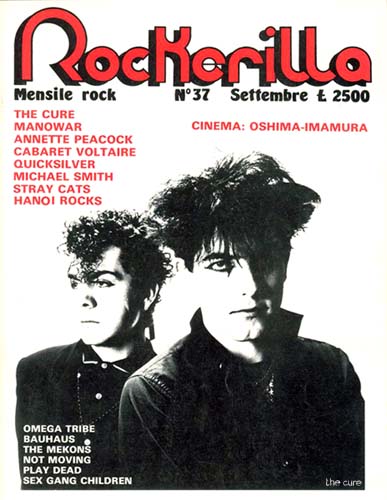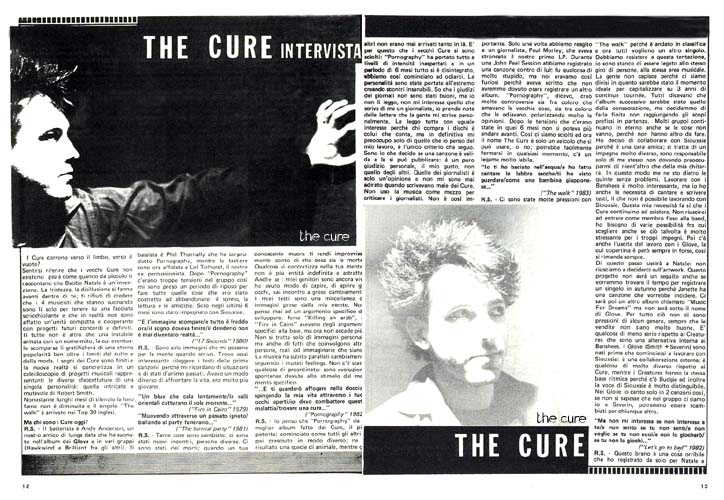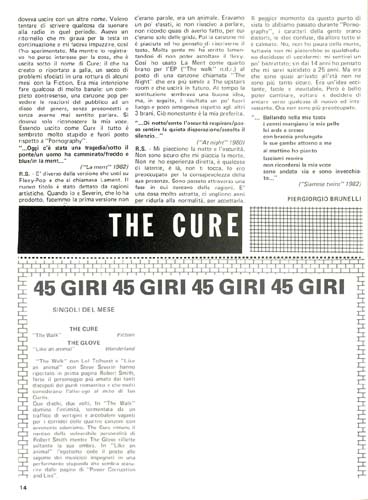The Cure Interview



The Cure - Interview
Do The Cure run towards the limbo, the void?
To be told that the old Cure don't exist anymore is like being told Santa Claus isn't real when you're a child. Sadness and disillusion spread inside of you; you refuse to believe that the four musicians playing are there just to hold a creaking fašade and that they aren't a compact and co-operating group with concordant and defined future projects. It's all but an unstable army with a mythical name, whose eventual demise will reward them with eternal popularity, well beyond the boundaries of cult and fashion. The Cure dreams are over and the new reality consists of a kaleidoscope of music projects that represent the various aspects of a single personality: Robert Smith's entangled and ever-changing one.
Despite the long months out of the limelight their popularity hasn't diminished and the single "The walk" has entered the British Top 30.
But who are The Cure today?
R.S. The drummer is Andy
Anderson, an old friend of ours who played on The Glove album and in various
groups (Hawkwind and Brilliant among others). The bassist is Phil
Thornalley, who co-produced Pornography and on keyboards we now have Lol
Tolhurst, our former percussionist. After Pornography there were too many
tensions within the group, so I took some time off to do all those things I
had been forced to give up: sleep, reading, friendship. In the last six
months I was very busy with Siouxsie.
"And the picture disappears/and everything is cold now/the dream had to end/the wish never came true..." (17 Seconds, 1980)
R.S. It's just images crossing my mind when I write. I find it very interesting to re-read the lyrics of our first songs, because they remind me of past situations and feelings. I had another approach to life, I was much younger.
"Slowly fading blue/the eastern
hollows catch the dying sun" (Fire in Cairo, 1979)
"Moving through an unknown past/dancing at the funeral party" (The funeral
party, 1981)
R.S. Many things have changed: there have been new meetings, different people. Some people died; when someone you know dies you suddenly realize what death is. Something takes shape in your mind, it's not an indefinite, abstract entity anymore. Even if my parents are still alive I could understand, it opened my eyes, you face great changes. My lyrics are a miscellany of images taken from my mind. I never think of a specific subject to develop; perhaps "Killing an Arab" or "Fire in Cairo" were based on specific subjects, but now it doesn't happen anymore. It's not just personal images, but also events involving other people, real or imaginary ones. The music has changed along with my changing feelings. It wasn't something I decided: it's a spontaneous evolution caused by a certain moment's stimulus.
"...And I'll watch you drown in the shower/pushing my life through your open eyes/ I must fight this sickness/find a cure..." (Pornography, 1982)
R.S. I think "Pornography" is the best album The Cure have made, the most powerful: it started like the other ones, but then grew into something different; it turned into a kind of animal, while the others hadn't gone that far. That's the reason why the old Cure split up: "Pornography" brought out an unexpected intensity and in six months time everything disintegrated, we started hating each other. Personalities were brought to an extreme causing relentless fights. I know the press wasn't kind with us, but I don't read reviews, I don't care what a journalist write about me, I take notice of the letters people write to me personally. I read them all with equal interest because I know the people who buy our records are important, but in the end the only important thing is what I think of my own work, that's the only criterion I follow.
What journalists write is just an opinion, I never got angry when they slagged The Cure off. I don't use music as a way to criticize journalists. It's not so important. Only once we reacted to a journalist, Paul Morley, who had torn our first album apart. During a John Peel Session we recorded a song against him; it was a very stupid thing, but we were so mad because he had written we should never dare record another album. "Pornography", as I was saying, caused a lot of controversies both among those who loved our old stuff and those who hated them, polarizing opinions. After the tensions of those six months we couldn't go on like that. So we split up and now the name The Cure is just a vehicle to be used or not; we could stop any moment, there's a very fragile bond.
"I kissed you in the water/and made your dry lips sing/I saw you look like a Japanese baby..." (The Walk, 1983)
R.S. There was so much pressure around "The Walk" because it went in the charts and now everyone wants another single. We must resist this temptation, I'm tired of being bound to the same group of people, the same music area. People don't understand why we split up, since this would be the ideal moment to take advantage of three years of incessant touring. Everyone was saying that our next album would be the definitive one, but we decided to call it quits without reaching our initial goals. A lot of bands go on forever even if things don't work, because they have nothing else to do. I decided to collaborate with Siouxsie because she's a dear friend; it's a very different thing, I'm only responsible for myself and my guitar parts. This way I'm out of the limelight and without problems. Working with the Banshees is very interesting, but I also feel the need to sing and write lyrics, which is not possible with Siouxsie. This necessity keeps The Cure alive. I couldn't be a regular member of the band, I need to be able to make choices as well, even if sometimes that's very stressful because of too many engagements. And then there's the release of The Glove album, whose cover is still not certain, so we keep putting it off.
At his rate it will be out at Christmas: we can't make up our mind about the artwork. This is a stand-alone project, even though we'd like to take the time to record a single next autumn because there's a song Janette would like to sing. Then there will be another album called "Music For Dreams", but it won't be under the name of The Glove. There isn't any kind of pressure around this, unless it sells really well. It's not as serious as The Creatures, which is an internal alternative to the Banshees. The Glove (Smith + Severin) was born before I started working with Siouxsie: it's an external collaboration; it's something very different from The Cure, while The Creatures have the same rhythmic base because of Budgie and Siouxsie's voice is very recognizable. In The Glove album I only sing in two songs so, if you didn't know Severin and I are in the band, you could think it's anybody.
"But I don't care if you don't/and I don't feel if you don't/and I don't want it if you don't/and I won't play it/if you don't play it first..." (Let's Go To Bed 1982)
R.S. This is a horrible thing I recorded for Christmas and it was supposed to have a different title. I wanted to try and write something that could be played on the radio in that period. I had a chorus playing around in my head that was driving me crazy, so I tried it out. But during the recordings I lost interest in the whole thing, that was released under the name of The Cure. That caused a lot of problems that eventually ended up in a temporary breaking off with Fiction. I wanted to do something very dull, nonsensical, a pop song to see how people would react to a record like that, with no prejudices and without having heard of it. The only recognizable thing would have to be my voice. But as it was released under the name of The Cure, it all seemed really stupid and out of place compared to "Pornography".
"Today there was a tragedy/underneath the bridge/a man walked/cold and blue/into La Ment..." (La Ment, 1982)
R.S. This is different from the Flexi-Pop version called Lament. There are artistic reasons behind the new title. When Severin, who produced it, and I did the first version, there weren't words, it was an animal. We were a bit dazed; I couldn't speak, I don't remember actually doing it, so there were only screams. But I liked the song and I thought of rewriting the lyrics. A lot of people wrote to me complaining about not being able to listen to the flexi. So I used La Ment as fourth song for the EP ("The Walk") instead of a song called "The Night", that sounded more like "The Upstairs Room" and will be released in the future. At the time it seemed like a good idea, but then we realized it was a bit out of place and it didn't merge well with the other three songs. Still, it's my favorite one.
"At night/I hear the darkness breathe/I sense the quiet despair/listen to the silence..." (At Night, 1980)
R.S. I like the night and the dark. I'm not sure I like death. I haven't experienced it directly, but it's something latent, it's there, it doesn't touch you. I'm aware of its presence and that worried me. I went through a phase in which I was looking for reasons. It's something very abstract, it takes you years to turn it into something normal, to accept it. Speaking of this, the worst moment was during "Pornography", people's personalities were distorted, ideas were confused, everything's calmed down since then. No, I'm not afraid of death, but I wouldn't like it if someone decided to kill me: it wouldn't be fair, since I was 14 I've thought I would kill myself at 25. But now that I'm almost there I'm not so sure about it. It was an exciting idea, easy and unavoidable. But it's good to be able to change, to look back and decide to keep going towards something new and interesting. I'm no longer worried now.
"...Dancing in my pocket worms eat my skin, she glows and grows with arms outstretched her legs around me... In the morning I cried leave me to die you won't remember my voice I walked away and grew old..." (Siamese Twins, 1982)
Interview by Piergiorgio Brunelli
REVIEWS
The Cure "The Walk" Fiction
The Glove "Like An Animal" Wonderland
"The Walk" with Lol Tolhurst and
"Like An Animal" with Steve Severin have marked the return into the
limelight of Robert Smith, probably the most popular and loved singer among
the many disciples of romantic punk and who is considered by many the
counterpart to Ian Curtis' myth.
Two albums, two faces. In "The Walk" we find intimacy, tormented by a
whirlwind of vertigo and rainbows wandering the corridors of the four songs
with enticing hedonism. The Cure is still the narcissus of Robert Smith's
vulnerable personality, while The Glove only reflects his shadow. In "Like
An Animal" egotism is put aside in favor of musicians' shapes performing a
brilliant show that seems to come out of the pages of "Power Corruption and
Lies".
THANKS to: Gothikmaus (MFC) for the TRANSLATION.